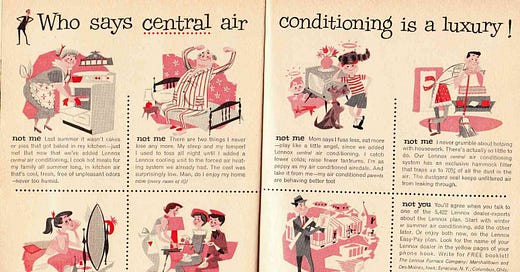Yes, air conditioning is a necessity now.
But I think the reaction to Stan Cox's article is a bit harsh.
I was shocked at the vehemence and anger in response to Stan Cox’s article in The New York Times, I Swore Off Air-Conditioning, and You Can, Too. Kendra blueskies (or whatever you call a message there:
“This is, and I'm not being hyperbolic, journalistic malpractice. Imagine NYT, WSJ or WaPo running a piece titled "I swore off basic hygiene and you should too" you'd be livid. Air conditioning is a literal life saving device in an increasingly warmer world.”
Ketan Joshi notes that it isn’t so simple:
“As always: crappy pieces (and the rage-bait headlines editors use) like this present air-con as a binary when IRL it's a distributive issue: There are millions of people who need AC to survive but don't have it ; There are millions of people who have AC, but don't need it to survive.”
I was suprised by all this, given that I rather liked Cox’s 2012 book “Losing our Cool” and would quote him often about how air conditioning has changed the way we design our buildings and our communities:
“Having developed efficient cooling, we've designed homes, businesses and transportation systems that are completely dependent on it, while the resulting greenhouse emissions create the need for even more air-conditioning.”
It was a sensible book. In many ways, Cox has written a sensible article, if you live in temperate Kansas, where he notes the temperature can drop 20 degrees in a matter of minutes. The title isn’t even accurate; Cox has not sworn off AC, his house has it and he has a window unit for the bedroom for the hottest nights. He tries to practice what he has preached for decades, using fans and water sprays, both of which only work if the air is dry enough that you can cool through evaporation. It sounds silly but he saves lots of money, is more comfortable outside because he is used to hotter temperatures, and often visits a shady park or sits on his screened porch. He acknowledges that others can’t do this:
“Year in and year out, heat waves kill more people than any other type of natural disaster. If you live in Miami or Phoenix, you need air-conditioning to survive the summer. But if you live in the middle of the country, try leaving the air-conditioning off when it’s hot but not too hot.”
My emphasis; he is not talking about Lagos or Mumbai. I think the reaction to Cox’s article is a bit harsh; there are many people out there who have been complaining about the overuse of air conditioning for years, including me. Back in 2012, Daniel Engber wrote in Slate:
“A certain class of Americans—let’s call them the brrr-geoisie—has come to see the air conditioner as a stand-in for everything that’s wrong with the country and the world.”
I was a card carrying member of the brrr-geoisie, as is Stan Cox. But the world has changed;
it’s hotter, and all the growth is happening in the south where it is hotter still.
Air conditioning has changed; we have better refrigerants, a cleaner grid, and cheaper solar power that kicks in when the AC is needed most. The AC units can run backward and work as heat pumps and help reduce dependence on fossil fuels.
I have changed; I realized how lucky and spoiled I was, to have been able to buy a nice old cross-ventilated house with a big shade tree in front. And the tree died.
I was also wrong. It takes less energy to cool someone in the south than it does to heat someone in the north; the Delta T, the difference between the interior and the exterior, is smaller when cooling than when heating. Hotter places have more sunlight and their AC can run on solar power now; our bigger heating and cooling problem is how to handle the depths of winter up north when there are longer cold nights and less sunshine. AC has also made life safer, easier, and more comfortable for so many people; As Rowan Moore wrote in The Guardian in 2018,
In pointing out the shortcomings of air conditioning, it is easy to overlook its achievements, to ask, in the style of Life of Brian, what it ever did for us. Considerable reductions in the loss of life through excess heat is one answer. Increased productivity and economic activity in hot regions of the world is another. Or better-functioning hospitals and schools. Most of us would be grateful for its contribution to computing and movies. Few people who have spent time in hot and humid climates would not sometimes want the refuge of artificially cooled air.
What we have to do is minimize our use of air conditioning and heating by designing better buildings and reducing demand. Engineer Ted Kesik says we should design for “thermal autonomy, where you design your building to need as little heating and cooling as possible, for as much of the year as possible. Doing this reduces energy consumption, extends the life of mechanical equipment, and reduces peak demand on the energy grid, an important consideration if we are going to electrify everything." Note from his drawing how much less cooling and heating is required if we design for high performance.
In a post I wrote last summer, I noted also that we had to plant trees and get rid of cars, a major source of urban heat and pollution. Mike Eliason has written that we need exterior shading to keep the heat out. The late Monte Paulsen noted that even in the Pacific Northwest in Passivhaus designs, air conditioning would be necessary in multifamily buildings.
“Why? Multi family buildings are more dense than single-family dwellings. More people means more cooking, more showers, and more appliances, all of which add up to more internal heat gains.”
And of course, Extinction Rebellion had the best advice: have an ice cream, and dismantle the fossil fuel industry that is causing the climate crisis in the first place.
But in the meantime, we have to design our cities and our buildings to use AC sparingly, carefully, and equitably; as Ketan Joshi notes, it’s not infinite. Those of us who can should try to use less of it. It’s all about sufficiency: how much to you really need?
That’s what Stan Cox is trying to do. Perhaps he goes overboard with the water sprays, and he is probably wrong about the impact of dishwashers, but doing one’s best to reduce their use of air conditioning makes sense, especially if you live in Kansas.









Architecture is everything. The house I grew up in had trees shading it and windows on three sides for a crossbreeze. We didn't have AC til I was in my teens and then only used it during real heatwaves.
My small downtown condo, on the other hand, is immediately intolerable without AC on any day over 20C. One entire side is a wall of glass, the small windows open barely 10 inches, and there's no crossbreeze -- propping the hallway door open is against the rules for security reasons.
But, all that said, I suspect my car-free shoebox lifestyle is far more carbon friendly overall than the suburban house.
There are just so many variables, I think that's why these clickbaity headlines infuriate so many.
I've lived my entire adult life without air conditioning my home, a luxury that living in San Diego gives me. The climate is nonetheless changing, and summers are hotter and more humid. Lots of folks I know here who have enjoyed the refrigerant-free lifestyle have opted for air conditioning, and my wife is growing more eager to cool our place down when it gets hot.
I still think that we are missing some obvious solutions, like planting shade trees, ensuring cross ventilation, awnings, etc. to mitigate the heat.